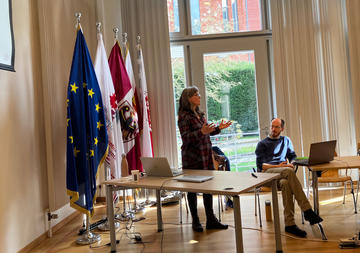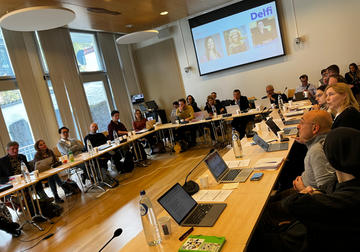
PULSE's project partners meeting in Brussels - Photo OBCT
Last week saw the presentation in Brussels of "PULSE. Europe beyond the beat", an ambitious project coordinated by OBCT aimed at making collaboration among European newsrooms a tool to harness the coverage of European affairs
"This is a great and ambitious initiative we are launching, centred on collaboration. PULSE embraces a ‘collaborative by design’ approach to editorial production, uniting prominent national media outlets and transnational media organisations in a mission to foster a vibrant European public sphere”, said Chiara Sighele, PULSE project manager at OBCT, the organisation leading the consortium at the opening of the meeting that took place in Brussels from 18 to 20 March at which around 30 journalists from the partner newspapers met to lay the foundations for the collaboration.
PULSE – Europe beyond the beat, led by Italian online media and think tank OBCT, aims to establish a Collaborative Hub animated by 10 leading national media outlets (Delfi - Lituania, Deník Referendum - Czechia, Der Standard - Austria, EFSYN - Greece, El Confidencial - Spain, Gazeta Wyborcza - Poland, Hotnews - Romania, HVG - Hungary, Il Sole 24 Ore - Italy, Mediapool - Bulgaria). These will pool their resources and expertise to produce collaborative articles and videos on a daily basis.
Three esteemed transnational media organisations – OBCT, n-ost , and Voxeurop – will coordinate the project’s activities, which also include the offering of free content to third party outlets, and the set-up of 4 open thematic networks of journalists focusing on crucial topics such as the Enlargement of the EU; Europe and global powers dynamics; the EU’s green transition; media and information society.
The partners will form a large “transnational newsroom” that will jointly produce more than 2,000 stories in two years, including in-depth articles in different formats and at least 12 different European languages. By engaging with journalists from 12 EU countries, combined with a number of external partnering newsrooms and journalists covering essentially every European country, PULSE will report on European affairs from new and multiple perspectives. Special attention will be paid to underreported countries, regions, and social groups, including rural areas and small EU countries.
"With this collaboration between newsrooms, we aim to explore the confluence of the best of local journalism and the context of international journalism regarding issues concerning Europeans and local responses", says Alicia Alamillos,Editor-in-Chief of the International Section at El Confidencial.
“To maximise dissemination and impact, we will also produce information in Russian, as we are the most widely read source of reliable information in this language, both in Lithuania and Eastern Europe”, comments Oleg Yerofeyev, editor-in-chief of the Russian edition of Delfi - Lithuania.
PULSE adopts a multifaceted approach to collaboration. The Collaborative Hub ensures cohesiveness and efficiency to PULSE's editorial production. Simultaneously, PULSE invites broader participation through thematic networks, open for any European journalists to join. Through this inclusive framework, PULSE aims to substantially support and promote collaborative journalism across Europe.
“The unavoidable transition to the green economy is a classic example of a project that can succeed only if it is carried out in the whole of Europe at the same time – and in a just way”, says Jakub Patočka, editor-in-chief of the Czech media outlet Deník Referendum. “If you want to tell this story to the public in all the European countries, you cannot succeed without cooperating with partners in them. That is one of the ways we see the PULSE project playing a crucial role in establishing meaningful, truly pan-European collaborative journalism”.
Central to PULSE's mission is the cultivation of a European public sphere and greater EU literacy, in line with the general goals of the EU’s Multimedia Actions programme under which PULSE is co-funded.






















 To Top
To Top